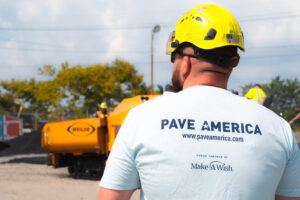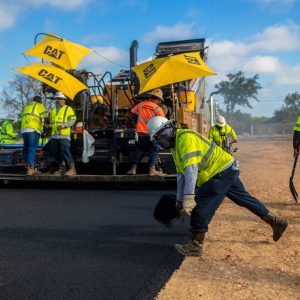Different types of asphalt paving or resurfacing projects can pose different challenges. Even if a paving contractor specializes in just one or two types, the challenges can vary by job. For example, there are many differences between the requirements for a suburban residential driveway and a heavily traveled boulevard in a large city, and there are different challenges if the residential driveway is on a steep hill or slopes downward. Paving and resurfacing residential streets can also present some unique challenges.
How Do Asphalt Companies Approach Residential Street Projects?
When a paving company needs to build a new residential street, the contractor first considers the two primary purposes of the street. The first is to provide safe access to homes as well as neighborhood parks, schools and other community features. The second is to help control traffic by establishing the most desirable patterns of movement. The contractor will then consider a variety of elements to design the street.
1. The local geography can impact the design of the street. Since residential streets are typically low-speed thoroughfares that support a low volume of traffic, they can follow the natural contours of the land if such a route is more economical, environmentally friendly or aesthetically pleasing.
2. The expected volume of traffic is a critical part of ensuring that the design will be correct. If the design is too weak, the pavement will fail prematurely, but making it unnecessarily strong is a waste of money.
3. The contractor must evaluate how well the pavement will drain. The depth of the water table, the type of soil, and the terrain surrounding the street can all affect drainage. If necessary, the contractor can include a subterranean drainage system, soil amendments, or curbs and gutters to ensure proper drainage.
The street resurfacing process includes an evaluation of traffic and drainage, but there are additional considerations.
1. If the pavement failed prematurely, the contractor will determine the underlying cause. Perhaps the volume of traffic exceeded expectations, too many heavy trucks began using the street, or new construction created unexpected drainage issues.
2. The existing pavement will connect to driveways and other streets. Milling will likely be necessary to ensure smooth transitions and retain the curb reveals.
3. Residential streets often have underground utilities in close proximity to the curbs, and some lines may run underneath the street. The contractor may need to mark and protect these utilities.
4. Traffic control can be a greater challenge during the street resurfacing process than during the initial construction. For example, a new subdivision with homes still under construction will likely experience a substantial increase in population over the years. The asphalt contractor will need to pay special attention to his scheduling and traffic control methods.
Residential paving and resurfacing may present some unique challenges, but Alpha Paving knows how to meet them. We are a highly respected, experienced, full-service paving company serving most of Central Texas. Our services include street construction and maintenance, asphalt overlays, parking lot maintenance, asphalt sealcoating, parking lot striping, concrete repair and installation, thermoplastic pavement markings, asphalt repair and asphalt milling. We have customers in virtually all industries, including the health care, retail, property management, and hospitality industries. We provide services to municipalities, airports, churches, homeowner associations, apartment complexes, subdivisions and office parks. Our customers can attest to the high quality of our work and our exemplary service. Ask for a free quote today by filling out the online request form or calling our office in Round Rock at 512-677-9001.




